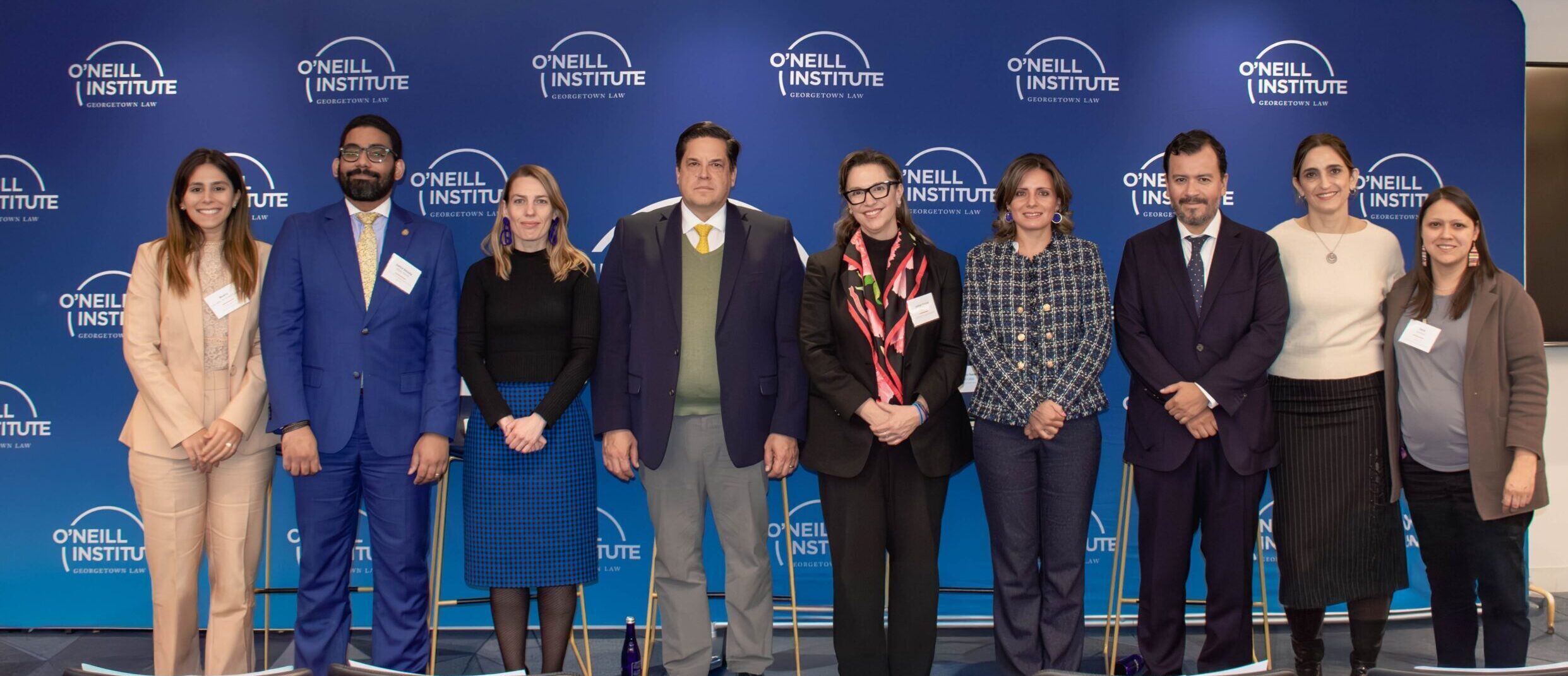
Last week, the O’Neill Institute’s Center for Health and Human Rights at Georgetown Law held the inaugural Judicial Dialogues on Health and the Law in Latin America and the Caribbean event, bringing together high court justices from across the region to reflect on the judiciary’s role safeguarding and promoting health as a public good. The landmark event featured Justice Natalia Ángel Cabo of the Constitutional Court of Colombia, Justice Amaury A. Reyes Torres of the Constitutional Tribunal of the Dominican Republic, Justice Catalina Lagos Tschorne of the Constitutional Tribunal of Chile, Justice Alfredo Gutiérrez Ortiz Mena of the Supreme Court of Mexico, and Justice Karla Andrade Quevedo of the Constitutional Court of Ecuador.
The Judicial Dialogues served as a platform for meaningful exchange on issues at the intersection of health, law, and human rights. Over the two-day event, the Justices and other esteemed experts, including Professor Sofia Charvel, Professor Jordi Ferrer Beltrán, Magistrate David Garcia Sarubbi, and Special Law Clerk Beatriz Carvalho de Araujo Cunha, engaged in substantive discussions about the judiciary’s role in addressing the growing challenges facing the protection of health through rights-based approaches in Latin America and the Caribbean. Silvia Serrano Guzmán and Oscar Cabrera, co-directors of the Center for Health and Human Rights, emphasized in their introductory remarks the pressing need for these types of dialogues.
They underscored the importance of understanding that the judicialization of health goes beyond the traditional approaches and includes prevention as a key component. They also highlighted that while the judicialization of health can bring enormous challenges, there are avenues to overcome those challenges while strengthening access to justice. This kind of transnational learning and exchange between peer Justices is a critical step toward this end.
In a session on the regulation of private actors, Justices and other experts discussed the role of the judiciary in upholding States’ obligation to protect health-related rights in the context of corporate activities. They analyzed decisions in Colombia and Mexico centered on front-of-package warning labeling in unhealthy foods, as well as the taxation of ultra-processed sweetened beverages. Panelists also explored cross-cutting issues related to evidence, legal reasoning, and the balance between deference to technical actors and judicial review.
Justices and other experts also participated in a session on equality, non-discrimination and intersectionality, engaging in critical discussions about how the judiciary addresses discrimination and structural inequalities in societies, with a focus on how those disparities negatively impact healthcare and public health. Justices from the Dominican Republic, Chile, and Ecuador shared their experiences adjudicating cases involving historically disadvantaged groups and discussed the potential for courts to advance health equity.
In a session on sexual and reproductive health, Justices from Colombia, Mexico, and Chile reflected on the different approaches that the judiciary can take to the decriminalization of abortion, placing this topic within the broader context of cases adjudicating sexual and reproductive health and discussing both lessons learned and ongoing challenges in implementing judicial rulings.
Finally, in a session on environmental protection, Justices and experts explored the intersection of the environment and health. Panelists from Ecuador, Mexico, the Dominican Republic, and Brazil examined the role of courts in interpreting rights-based frameworks to address environmental risks and their impact on health outcomes.
The event culminated in a public conference on Health Rights and the Courts in Latin America and the Caribbean. Justices reflected on their role in upholding the right to health and related rights, sharing insights on how they have navigated the tension between judicial intervention and other branches of government, as well as the impact of their decisions on the public health landscape.
The Center for Health and Human Rights hopes to continue providing a platform for Justices and legal experts to exchange ideas and strengthen the role of the judiciary in advancing health and human rights at Judicial Dialogues in future years. The success of this inaugural event marks an important step toward fostering greater collaboration among courts and academics across Latin America and the Caribbean.
Watch the recording on our YouTube page.
